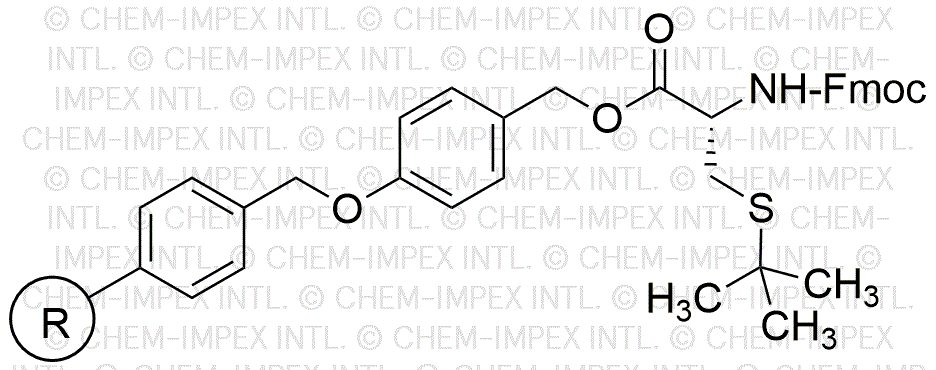Fmoc-S-tert-butyl-D-cysteine 4-alkoxybenzyl alcohol resin is widely utilized in research focused on:
- Peptide Synthesis: This resin is essential in solid-phase peptide synthesis, allowing for the efficient assembly of peptides with specific sequences, which is crucial in drug development and therapeutic research.
- Bioconjugation: It serves as a versatile linker for attaching biomolecules, enabling researchers to create targeted drug delivery systems that improve the efficacy of treatments in cancer therapy.
- Protein Engineering: The resin facilitates the modification of proteins, which is vital for studying protein interactions and functions, enhancing the understanding of biological processes.
- Analytical Chemistry: It is used in the development of analytical methods for detecting and quantifying peptides and proteins, aiding in quality control and assurance in pharmaceutical manufacturing.
- Material Science: The resin can be incorporated into novel materials for biomedical applications, such as tissue engineering, due to its biocompatibility and functional properties.
Información general
Propiedades
Seguridad y normativas
Aplicaciones
Fmoc-S-tert-butyl-D-cysteine 4-alkoxybenzyl alcohol resin is widely utilized in research focused on:
- Peptide Synthesis: This resin is essential in solid-phase peptide synthesis, allowing for the efficient assembly of peptides with specific sequences, which is crucial in drug development and therapeutic research.
- Bioconjugation: It serves as a versatile linker for attaching biomolecules, enabling researchers to create targeted drug delivery systems that improve the efficacy of treatments in cancer therapy.
- Protein Engineering: The resin facilitates the modification of proteins, which is vital for studying protein interactions and functions, enhancing the understanding of biological processes.
- Analytical Chemistry: It is used in the development of analytical methods for detecting and quantifying peptides and proteins, aiding in quality control and assurance in pharmaceutical manufacturing.
- Material Science: The resin can be incorporated into novel materials for biomedical applications, such as tissue engineering, due to its biocompatibility and functional properties.
Documentos
Hojas de datos de seguridad (HDS)
La SDS proporciona información de seguridad completa sobre la manipulación, el almacenamiento y la eliminación del producto.
Especificación del producto (PS)
La PS proporciona un desglose completo de las propiedades del producto, incluida la composición química, el estado físico, la pureza y los requisitos de almacenamiento. También detalla los rangos de calidad aceptables y las aplicaciones previstas del producto.
Certificados de análisis (COA)
Busque certificados de análisis (COA) ingresando el número de lote del producto. Los números de lote y de partida se pueden encontrar en la etiqueta de un producto después de las palabras "Lote" o "Lote".
Número de catálogo
Número de lote/lote
Certificados de origen (COO)
Este certificado de origen confirma el país en el que se fabricó el producto y también detalla los materiales y componentes utilizados en él y si se deriva de fuentes naturales, sintéticas u otras fuentes específicas. Este certificado puede ser necesario para cumplir con las normativas aduaneras, comerciales y regulatorias.
Número de catálogo
Número de lote/lote
Hojas de datos de seguridad (HDS)
La SDS proporciona información de seguridad completa sobre la manipulación, el almacenamiento y la eliminación del producto.
DownloadEspecificación del producto (PS)
La PS proporciona un desglose completo de las propiedades del producto, incluida la composición química, el estado físico, la pureza y los requisitos de almacenamiento. También detalla los rangos de calidad aceptables y las aplicaciones previstas del producto.
DownloadCertificados de análisis (COA)
Busque certificados de análisis (COA) ingresando el número de lote del producto. Los números de lote y de partida se pueden encontrar en la etiqueta de un producto después de las palabras "Lote" o "Lote".
Número de catálogo
Número de lote/lote
Certificados de origen (COO)
Este certificado de origen confirma el país en el que se fabricó el producto y también detalla los materiales y componentes utilizados en él y si se deriva de fuentes naturales, sintéticas u otras fuentes específicas. Este certificado puede ser necesario para cumplir con las normativas aduaneras, comerciales y regulatorias.

